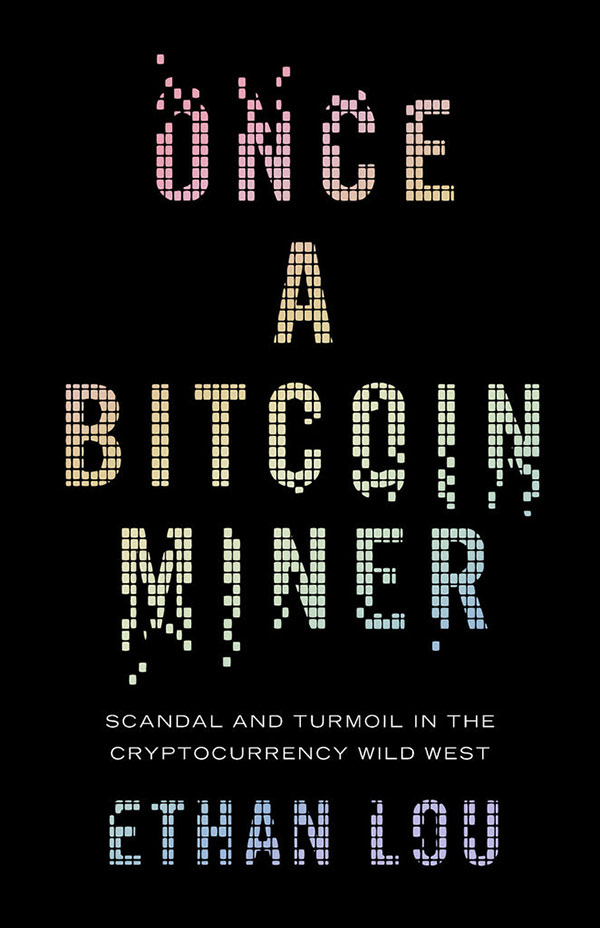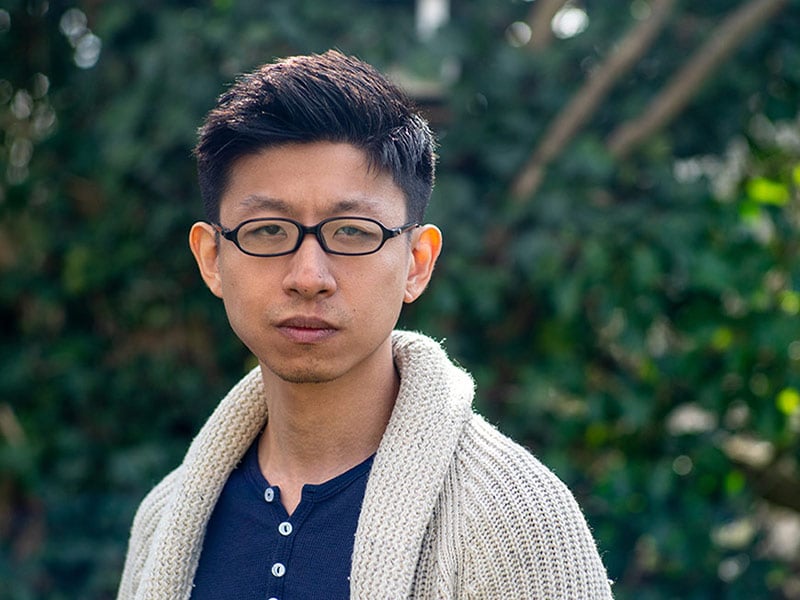I’ve often thought there were two kinds of people: cryptocurrency enthusiasts, and everyone else. As a member of the latter category, I’ve tried hard to stay ignorant. I don’t know what the deal is with those ape doodles and I’m determined to never find out.
But reading Ethan Lou’s book, Once a Bitcoin Miner, revealed him to be a member of the elusive third type: someone who understands cryptocurrency but remains skeptical, an outsider’s insider. The book, which follows the highs and lows of Lou’s journey through bitcoin investing, is accessible and intriguing, even for readers who don’t really understand what a Bitcoin ATM does. (The book explains it’s not an ATM at all, but rather a place to buy or sell Bitcoin — which ruined my illusions of giant novelty coins being dispensed as if from a gumball machine.)
Lou began buying bitcoin as a journalism student in 2013, so captivated by its possibilities that he even gave his nonplussed parents bitcoin for Christmas. He rides out the highs and lows, attending crypto meetups in casinos and starting his own bitcoin mining business. By 2017, Bitcoin has made him a millionaire, and he quits his job as a reporter at Reuters, including a Game of Thrones quote in his resignation letter. He travels to North Korea for a dubious cryptocurrency conference, gets high by a penis-shaped pool on a Thai island, and tracks the fortunes and feuds of the Bitcoin community’s self-appointed leaders. Throughout, he remains a self-effacing and genial tour guide, a skillful observer in a strange world.
“I decided to write the book in 2018,” he told me by phone from his home in Toronto. “But the idea only solidified in early 2019.” Lou turned in a draft of the book at the end of that year, and then found himself in China in the first weeks of what would become the COVID-19 pandemic. His experiences became another book, Field Notes from a Pandemic, which was published in September 2020, named one of the best non-fiction books of the year by CBC.
“From the outside it definitely appears I’m more productive than I really am,” says Lou. “Once a Bitcoin Miner was supposed to come out in the fall of 2020. But then I got caught travelling amid the pandemic, and around that time my agent and I were discussing the next book. I had written a piece in Maclean’s about my experience in China, so I ended up writing a second book from there. Because it was much more timely, it ended up pushing the Bitcoin book to 2021. So Field Notes from a Pandemic was written in a very short period of time, and I’ll never do that again.”
Lou is no longer a bitcoin miner, though he remains an investor. He’s a columnist for the Financial Post, where he writes frequently about cryptocurrency, and he also writes for other publications, including The Tyee. He’s also an avid reader with refreshingly wide-ranging tastes.
“I think of myself as a slow reader,” he says. “In a typical year, I get through 15 or 20 books.” On a pleasant January afternoon, he told me about his latest garbage-room novel discovery and the history book he tried to pair with a trip to Medieval Times. The interview has been lightly edited for length and clarity.

What do you like to read for pleasure?
I started keeping track of what I read in 2019, and it can be quite all over the place. I’ve read quite a lot of books by well-known people, but perhaps not their well-known works. I read Siddhartha by Herman Hesse, but not Steppenwolf. And I don’t think I ever will read it, though I liked Siddhartha very much, because there are lots of authors in this world and I have so little time on it, so I try not to read too many works by the same authors.
Maybe because of what I do, I gravitate toward non-fiction. Probably half of what I read is narrative non-fiction.
Once a Bitcoin Miner has a lot of literary references and allusions. Did you draw on the fiction and non-fiction that you’ve read when putting it together?
Yes, definitely. You know how Method actors will immerse themselves in the world of their character? Well, I wanted to have this Western tone throughout the book, so I read quite a lot of Westerns. Louis L’Amour, and a guy called Trevanian who might be my favourite author. He wrote Incident at Twenty-Mile which I reread to prepare for writing this book.
I also like to think of the book as a kind of picaresque adventure, like Don Quixote. Though I haven’t actually read it, I’ve read other books that my professors have said are like Don Quixote, like V.S. Naipaul’s A House for Mr Biswas. And Bill Bryson, I like his writing, so for that travel aspect of the book I drew inspiration from him.
Do you ever feel like a translator, in a way? To me it feels like there’s a bitcoin community that is pretty opaque and secretive, and then you have carved out this very interesting niche explaining that community to people who don’t know anything about it.
Oh, I’ll get to your question, but I just remembered — another influence I had when writing the book was Neil Strauss’s The Game. In the beginning I modelled it on that. At the beginning of that book, he doesn’t have success with women, he’s seeking something, there’s a void, and that led him to be immersed in this insular community. I saw a bit of a parallel there.
In terms of being a translator, I feel like the lines between the crypto world and the wider world have been blurring, and they’ll get blurrier, and soon perhaps it won’t seem so insular to people on the outside.
You wrote an essay about reading as a way of dealing with everything that was going on during the pandemic, and I was wondering if you could tell me about a few things you read that you found particularly valuable.
Well, most of the books I wrote about in that TVO essay were the books I read during the pandemic, with the exception of Romance of the Three Kingdoms by Luo Guanzhong. I listened to that as an audiobook when I was a kid. And Cloud Atlas by David Mitchell, that was a long time ago. At the beginning of the pandemic I was reading Louis L’Amour, David Chariandy.
But the books that most defined my pandemic experience were the non-fiction books, Stanley McChrystal’s Team of Teams and Nassim Nicholas Taleb’s The Black Swan, about dealing with risk and uncertainty. I also wrote an essay about reading The Decline of the West, a book by Oswald Spengler given to me by my father 10 years ago. I picked it up during the pandemic, and it’s about deep divisions around the world and the rise and fall of civilizations. Those three gave me perspective on what was happening. And The Decline of the West was not an easy book to get through. I think it took me six months to read it.
Why do you think those three non-fiction books stuck with you?
Perhaps because with fiction, I tend to get lost in it. Not in a bad way — I’m immersed, and I start identifying with the characters. I see the in-universe view. Whereas non-fiction, especially the narrative sort, I get a more clear-eyed view. Especially with The Decline of the West — the ideas were good, but this guy was not a great writer.
In Once a Bitcoin Miner, there are quite a few references to Greek and Roman history. I wondered if that was a particular interest of yours.
Oh yeah, I’m a big fan of the classics. It’s a period that endlessly fascinates me. I have to admit I don’t have any deep specialization. I didn’t study them formally and I haven’t read many texts from that era. Bits of The Iliad, and Conversations of Socrates, but I’ve read more modern portrayals. Like Spartacus by Lewis Grassic Gibbon. He’s probably more well-known for Sunset Song, but if you judge books by their opening, Spartacus has one of the best openings of all time.
Something I particularly appreciated in Once a Bitcoin Miner was that your literary references are very diverse. You mention Game of Thrones a few times, for instance. Are you a fan of the TV show as well as the books?
Oh absolutely. My Game of Thrones references are everywhere. They’re even in the Financial Post. I am a very big fan of the books, and half a big fan of the TV show.
You don’t like where they ended up in the later seasons?
I think if you look at the showrunners, they’re very good at adapting material but not so good at coming up with their own. That’s when Game of Thrones started sucking, when the show outpaced the books.
That’s true, it definitely starts falling apart. What do you love about those books?
I want to say the writing, but that’s such a vague thing to say. I like fantasy, but I also haven’t read much fantasy. When I read it, it reminded me of the fantasy I read much earlier, when I was younger. Particularly Lord of the Rings — I know they’re quite different, but it reminds me a little of that. I like the different perspectives, his depictions of food. And I like the different shades of grey in the morality spectrum of his world. All in all, a very good body of work.
What other fantasy have you read?
I read, or rather listened to, quite a bit of Chinese fantasy. There are a lot of fantasies among the major works of Chinese literature. Like Journey to the West, that’s the most famous one. And Investiture of the Gods. If you go back to like 2000 BC, a lot of Chinese history is just mixed with myth, so you’ll hear about historical figures travelling across the sea to meet with a monster.
Aside from Lord of the Rings, what else did you like to read as a kid?
I read Enid Blyton, and Goosebumps. I think I have read every single Goosebumps book. I was obsessed — I actually looked up the list of books to make sure there were none I hadn’t read.
You’re a completionist!
Yes, I’m very proud of that. I also read the Asterix comics — I’m a huge fan of comic books, I read both Marvel and DC. Throughout my teenage life I read a lot of those. Even now, periodically I try to pick a story arc and read it.
Do you have a comic collection?
No. Increasingly, I’ve become a guy who only reads stuff digitally. I only have one bookshelf at home. I don’t have many physical books nowadays.
What’s made the cut for your one shelf?
I have The Decline of the West, the copy my father gave me. Middle Power, Middle Kingdom by David Mulroney. He was the ambassador to China during the Harper years, and I got that in maybe 2015, that’s a book I’ve kept. I have Jan Wong’s Red China Blues, I got that in 2014. I have a bunch of technical journalism books, like style guides. I have Mythologies by Roland Barthes. I read that in school. The Big Shift by John Ibbitson and Darrell Bricker. Oh, and The Black Swan is still with me — I got that at a time when I was too young to read it, maybe in high school. I have other books at my parents’, there are some Goosebumps-type books in there.
How do you choose your books? Aside from trying not to read the same author too many times.
I think a lot of the time, the books choose me. I recently read Stephen King’s 11/22/63, and I absolutely loved it, but I only read it because I found it in my condo’s garbage room. It didn’t even come with a dust jacket, but I remembered a couple of years ago, a high school friend of mine mentioned it. So I guess I discover books the way most people do — through their daily lives, and what their friends tell them.
Was that your first Stephen King book?
No, but for a while I thought it was! Then I remembered that I read Different Seasons when I was a kid. I even watched all the movie adaptations of the four stories. But for a week or two I thought 11/22/63 was the first.
Wow, so you do read the more obscure books by popular authors.
Is that obscure?
Well, it’s so different from the rest of his work.
Well, they had some pretty popular movies made from it. But you’re right — I’ve seen the It movies but I haven’t read the book. It’s on my list, I’ve heard the way it’s portrayed in the book is very different from the movies.
Do you like horror, as a genre? It seems like a theme.
I think I just read everything. I like horror, but do I like it more than any other genre? I don’t think so. But I recently read Dracula for the first time as well, and I enjoyed it immensely.
Actually, recently I’ve been trying this thing. You know how people pair food and wine? I’ve been pairing a book with an activity, or a movie and a podcast. So I read Dracula, and then I was also watching this thing called The Strain, which is about vampirism. And I read Barbara Tuchman’s A Distant Mirror, about 14th century Europe, and watched The Last Duel, and then the activity was going to Medieval Times in Toronto. But we got locked down, so I couldn’t go.
I tried to do another one, reading Satori by Don Winslow. Portions of the book are set in Japan, so I paired it with Jiro Dreams of Sushi, and I was going to go for omakase. But we got locked down again so I couldn’t do that either. ![]()
Read more: Media


















Tyee Commenting Guidelines
Comments that violate guidelines risk being deleted, and violations may result in a temporary or permanent user ban. Maintain the spirit of good conversation to stay in the discussion.
*Please note The Tyee is not a forum for spreading misinformation about COVID-19, denying its existence or minimizing its risk to public health.
Do:
Do not: